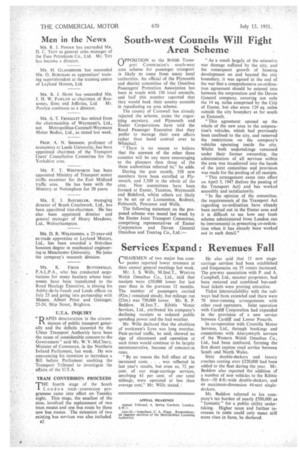South-west Councils Will Fight Area Scheme
Page 36

If you've noticed an error in this article please click here to report it so we can fix it.
OPPOSITION to the British Transport Commission's south-west area scheme for passenger transport is likely to come from many local authorities. An official of the Plymouth and district committee of the Omnibus Passengers' Protection Association has been in touch with 150 local councils, and half this number reported that they would back their county councils in repudiating an area scheme.
The county of Cornwall has already rejected the scheme, states the organizing secretary, and Plymouth and Exeter Corporations have told the Road Passenger Executive that they prefer to manage their own affairs rather than hand control over to Whitehall.
"There is no reason to believe that the answers of the other three counties will be any more encouraging to the planners than those of the three authorities referred to," he adds.
During the past month, 350 new members have been enrolled at Plymouth, and 5,500 in the whole of the area. New committees have been formed at Exeter, Taunton, Weymouth and Bideford, whilst others are likely to be set up at Launceston, Bodmiri, Falmouth, Penzance and• Wells.
The following statement on the proposed scheme was issued last week by the Exeter Joint Transport Committee, comprising representatives of Exeter Corporation and Devon General Omnibus and Touring Co., Ltd.:— "AS a result largely of the extensive war damage suffered by the city, and the consequent growth of housing development on and beyond the city boundary, it was agreed at the end of the war that a comprehensive co-ordination agreement should be entered into between the corporation and the Devon General company, covering not only the 14 sq. miles comprised by the City of Exeter, but also some 129 sq. miles outside the city boundary as far south as Exmouth.
"This agreement opened up the whole of the new area to the corporation's vehicles, which had previously been confined to the city, and removed the restrictions on the company's vehicles operating inside the city. Whilst both undertakings remained under their former ownership, the administration of all services within the area was transferred into the hands of the joint committee and provision was made for the pooling of all receipts.
"This arrangement came into effect on April 5, 1947 (before the passing of the Transport Act) and has worked smoothly and satisfactorily.
• "In the opinion of the committee, the requirements of the Transport Act regarding co-ordination have already been carried out in the Exeter area and it is difficult to see how any fresh scheme administered from London can be instrumental in promoting co-ordination when it has already been worked Out in such detail."




























































































